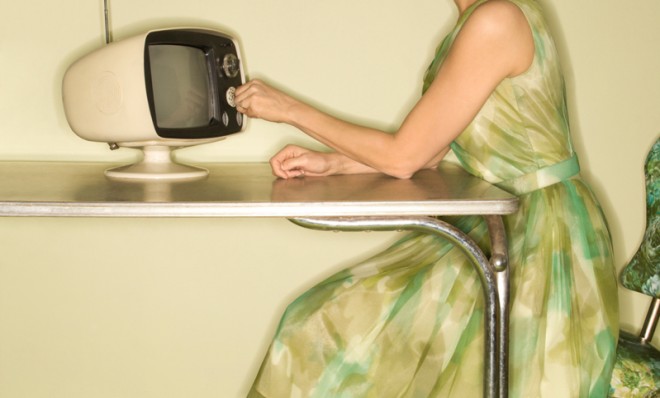3 companies that could change the way we watch TV forever
Time to say goodbye to bundling?

A free daily email with the biggest news stories of the day – and the best features from TheWeek.com
You are now subscribed
Your newsletter sign-up was successful
The $60-billion-per-year broadcast television industry is on the brink of major change. One of the big reasons, says the New York Times' David Carr, is the disappearance of something called "the bundle," and the dual desire of viewers and advertisers to find a better system. What exactly is bundling? It's essentially a system by which you're forced to order a TV meal as a lengthy prix fixe menu instead of selecting a smaller number of preferred dishes a la carte. "The channels you desire are paired with the ones you did not in your cable package," Carr says. And "as for advertisers, the audience they wanted was bundled inside a much larger audience of people they did not. To get the milk, both consumers and businesses had to buy the cow."
Carr highlights three companies that threaten to change TV by doing away with bundling. Here, we take a closer look at what each is doing.
1. Netflix
The Week
Escape your echo chamber. Get the facts behind the news, plus analysis from multiple perspectives.

Sign up for The Week's Free Newsletters
From our morning news briefing to a weekly Good News Newsletter, get the best of The Week delivered directly to your inbox.
From our morning news briefing to a weekly Good News Newsletter, get the best of The Week delivered directly to your inbox.
When Netflix released House of Cards in February, it marked a pivotal moment in programming: It was the first TV show created with no intention of airing on television. It was made by Netflix for Netflix subscribers, and unlike any show before it, debuted all 13 episodes at once.
It worked. Following its February 1 release, House of Cards quickly became the most streamed piece of content in the U.S. and 40 other countries, according to Netflix. And the show generated a ton of buzz.
House of Cards broke the rules not only because it's a TV show that bypassed TV, but also because big data algorithms helped develop it. The New York Times says Netflix tapped data from its 27 million subscribers before the company even knew what kind of show they were making. Here's what they discovered on that data deep dive: People love movies by David Fincher, movies starring Kevin Spacey and a British TV show called House of Cards. So what did Netflix make? A remake of House of Cards starring Kevin Spacey and directed by David Fincher, of course.
Now, others in the industry are following Netflix's lead. Amazon is producing its own original programming, and YouTube is in the process of opening its own production facility in L.A. for the same reason.
A free daily email with the biggest news stories of the day – and the best features from TheWeek.com
It explains why Forbes called House of Cards a "seminal event in TV history." If TV-quality shows can be purchased a la carte from a variety of content providers, people may well stop shelling out $100 or more a month for a giant suite of cable channels.
2. Aereo
Aereo lets you watch live TV from broadcast networks — CBS, NBC, Fox, ABC, the CW, and more — "wherever you are, whenever you want it." At least that's their promise. The start-up, backed by IAC chairman Barry Diller, crowds hundreds of thousands of tiny antennas into a storage facility, then assigns one antenna to each subscriber. Users can then broadcast TV on their mobile device as the signal is transmitted from the remote antenna. Aereo doesn't have to pay for this content — an April 1 court decision granted permission for them to keep running without paying any of the billions networks make in retransmission fees. That makes it cheap for the user, too: $8/month or $80/year. (Read our primer on how Aereo works here.)
Beyond simply taking power away from the networks, some think Aereo threatens to end network television once and for all. In the wake of last week's court ruling, Rupert Murdoch's News Corp. threatened to end Fox's 26-year run as a broadcast channel and bring it back to cable. "If CBS (CBS), NBC Universal (CMCSA), and ABC (DIS) follow suit and curtail free broadcast fare, it would hasten the end of the TV system that's endured since CBS, NBC, and ABC went on the air in the '40s," said Bloomberg Businessweek.
3. Dish Network
Aereo isn't the only pebble in Fox's shoe. The network is also complaining about Dish Network's Hopper with Sling, a DVR service that poses some of the same disruption problems as Aereo by allowing users to offload shows to any device, like an iPad or a laptop, to watch later — and hop over ads.
On Monday morning, Dish made a $25.5 billion offer to buy Sprint, which already has its own nationwide wireless network. The Atlantic Wire suggests Dish is setting its sights on the future:
Ideally Dish would like to hook people to pay TV early, [Dish Chairman Charles Ergan] said... That's where innovations like the Dish Hopper — which allows consumers to skip over commercials completely — come in. But, he ultimately knows that television watching is heading to the Internet, a la carte style, he said during an All Things D interview. "The Internet is really a la carte today," he said. "That's ultimately where we have to compete." What better way to compete than getting people to pay his company to serve them the very Internet that runs that online video. [Atlantic Wire]
Carmel Lobello is the business editor at TheWeek.com. Previously, she was an editor at DeathandTaxesMag.com.